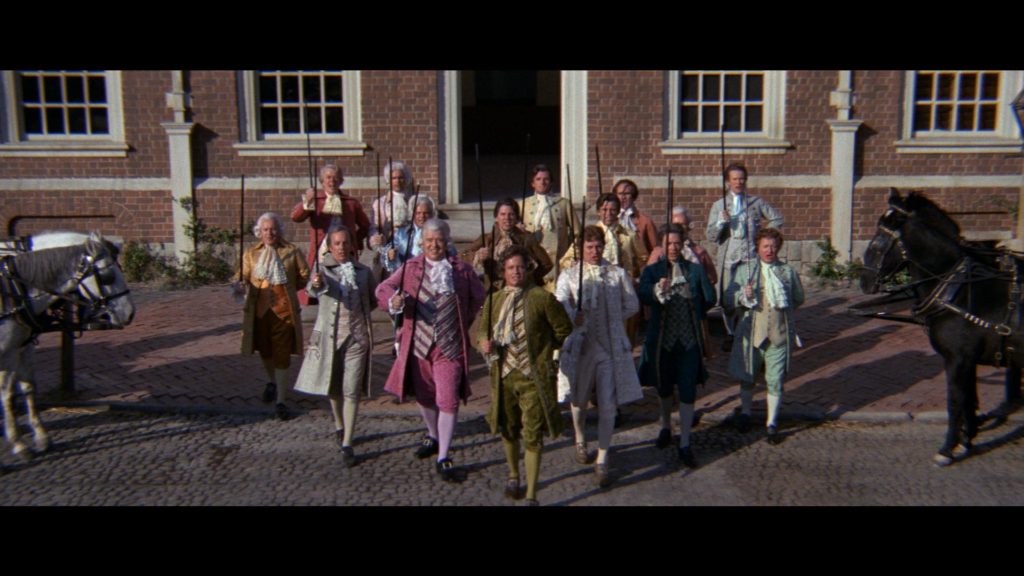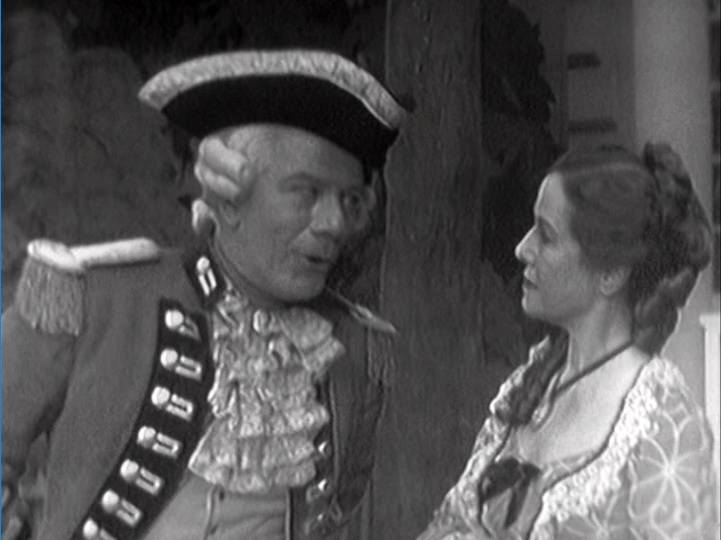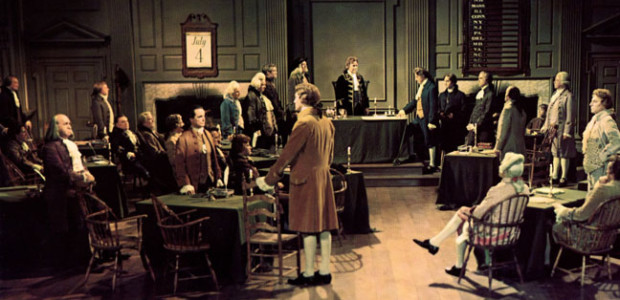Like all good Americans, you watched JAWS on Independence Day (or possibly you were inspired by the DG JAWS-PLOITATION podcast to take in a JAWS ripoff). But now you’re either in the middle of a weird split-week at work or you have the rest of the week off, why not continue your Americamas celebration with some American Revolution-themed musicals? If some jerk in your neighborhood can set off fireworks every night for the next week, you can keep celebrating our nation’s birth — the Bump & Grindhouse way!
1776 was one of the unlikeliest hits in Broadway history: a musical about the Second Continental Congress, and the writing and adoption of the United States Declaration of Independence. The central characters include middle school social studies stalwarts like John Adams, Benjamin Franklin, Thomas Jefferson, John Dickinson, and John Hancock. There was very little dancing, no intermission, and the songs were written by a history teacher-cum-pop songwriter Sherman Edwards. Not to mention the fact that it opened in the wake of Hair, which
And yet, 1776 is a marvelous show. Sherman Edwards’s score features musical monologues, extended musical scenes, a minuet, an Irish dirge, and a couple of good old-fashioned Broadway showstoppers. The songs are well-crafted, intelligent, and melodic. Peter Stone’s book is a marvel of plot, characterization, and genuine suspense. As the plot creeps ever closer to July fourth, you really start to wonder how these men will ever reach a consensus on independence. (Stephen Spielberg and Tony Kushner achieved a similar feat regarding the Emancipation Proclamation in LINCOLN). 1776 premiered on Broadway in 1969, won three Tony Awards, including Best Musical (notably beating out Hair for the award), and ran for three years on Broadway, another two years on the road, and even managed a successful London engagement.
Fortunately, much of the craft that made 1776 work so beautifully on stage was carried over into the 1972 film. 1776, the movie, like the Broadway show, was written by Peter Stone, directed by Peter H. Hunt and choreographed by Onna White. Several members of the Broadway company — among them William Daniels (Adams), Howard da Silva (Franklin), Ken Howard (Jefferson), and John Cullum (Edward Rutledge) – reprised their roles for the film, and their performances are richer for their experience. Making famous historical figures sing without irony or camp is no easy task. But these actors bring so much authenticity and humanity to their roles that their singing comes across as naturally as it does in any other musical.
I have a special affinity for Williams Daniels’s performance; my twitter handle is even a reference to it. His John Adams (as conceived by Edwards and Stone) is utterly convinced of his own rightness in his belief in American independency. He repeatedly refers to himself as “obnoxious and disliked.” He doesn’t care what people think of him; he only cares about the cause. John Dickinson (Donald Madden), is equally convinced that the cause for independency is tantamount to treason, and Madden matches Daniels’s passion at every step. It makes for some marvelous drama, and, as as you saw in the trailer, a sword fight with walking sticks. (Never mind that the real Dickinson was a Quaker. Swordfight!) Da Silva’s Franklin is as passionate as Adams, but his passion is tempered with a sense of humor and realism. Franklin makes Adams palatable to the other delegates (and the audience). Howard’s Jefferson is freaking gorgeous an almost reluctant intellectual who knows the cause is right even as he is aware of the hypocrisy of declaring freedom from England while owning slaves himself.
And the issue of slavery is addressed. The decision to delete a clause regarding slavery from the Declaration is the greatest source of tension in the climax film’s climax. After all, the slave trade was a major source of income and labor for the southern states. And Edward Rutledge delivers a searing performance of the song “Molasses to Rum,” describing the north’s hypocrisy in denouncing slavery while profiting from the triangle trade.
Everything in 1776 regarding slavery is an oversimplification of the issue, to be certain, but it’s also a reflection of the influence the Civil Rights movement had on theatre — even commercial Broadway theatre — of the late 1960s. If 1776 had been produced ten years earlier, slavery likely would have been whitewashed out of the story completely.

My enthusiasm for the piece is not to say 1776 doesn’t have its faults. 1776 was Hunt’s first film, and it frequently betrays its stage origins. Most of the dialogue is taken verbatim from Stone’s stage script, but without a live audience to react, that same dialogue — particularly the jokes — isn’t as effective on film. Similarly, Hunt’s lack of film experience is very evident early on in the proceedings. “The Lees of Old Virginia,” one of those showstoppers I mentioned above, is marred by rapid cutting that is totally incongruous with the rest of the movie, which generally features long takes, letting the drama play out for itself (which at times makes the movie feel more like a filmed play). After the first half hour, though, both the direction and screenplay improve noticeably. It makes me wonder if the film was shot in sequence, with Hunt learning as he worked. So if you decide to give the movie a go for yourself, give it chance to settle into itself before giving up on it.
The original cut of 1776 ran close to three hours, but it didn’t stay that long for long. The minuet I mentioned is titled, “Cool, Cool, Considerate Men,” which has the conservative members of the Continental Congress singing of the praises of the conservative members of the Continental Congress.
A sample of the lyric:
What we do, we do rationally.
We never ever go off half
Cocked not, we.
Why begin,
Till we know that we can win?
And if we cannot win,
Why bother to begin?
Producer Jack L. Warner took offense to the song and to the portrayal of the conservatives in general, as he thought it was critical of his pal President Richard Nixon. So he nixed the it. In fact, Warner had so little confidence in the public’s willingness to sit through three hours of 1776 (this time with an intermission) that he cut 40 minutes from the film before releasing it. “Cool, Cool Considerate Men,” was not the only music to be trimmed in the editing room, and its criticism of the conservatives is pretty tame, especially by today’s standards (boy howdy!). But the scene does contain this exchange between John Dickinson and John Hancock (David Ford):
Hancock: Fortunately, there are not enough men of property in America to dictate policy.
Dickinson: Perhaps not. But don’t forget that most men with nothing would rather protect the possibility of becoming rich, than face the reality of being poor.
It’s a testament to both Peter Stone’s talent — and the nature of American politics — that 1776 is as relevant today as it was in 1972.
To the best of my knowledge, there has only been one other musical set during the American Revolution, and that was Dearest Enemy, which played for eight months on Broadway, beginning in 1925, and was a considerable success. No feature film has been made of the property, but MAX LIEBMAN PRESENTS: DEAREST ENEMY was broadcast live on NBC on November 26, 1955. Fortunately, a kinescope of the production survives.
Like 1776, DEAREST ENEMY is based on a true story, that of Mary Lindley Murray, whose home in Kips Bay, Manhattan, was commandeered by British General William Howe following their victory at the Battle of Brooklyn. Murray tolerates General Howe’s presence until she receives orders from General George Washington, instructing her to stall the British troops, to allow the American soldiers to safely regroup and counterattack. This being a musical comedy, Murray naturally throws a ball for the British troops and romantic complications ensue.

The cast included Cornelia Otis Skinner as Mrs. Murray and Cyril Ritchard as General Howe. Real-life married couple Anne Jeffreys and Robert Sterling played Murray’s niece Betsy and the British Captain Sir John Copeland, who fall in love despite their national allegiances (the same goes for Murray and Howe). Jeffreys and Sterling’s natural chemistry carries over quite well to the small screen. Their story is romantic comedy 101: meet cute, hate each other at first sight, fall in love over the next two-and-half hours. But Betsy is a notably intelligent young woman, a proto-feminist unwilling to give up the fight for independence simply for a dashing young officer in breeches. Their relationship contrasts nicely with Ritchard and Skinner’s, who are clearly having a great deal of fun as the equally tried and true older and wiser couple.

Dearest Enemy was the first complete Broadway score written by Richard Rodgers (music) and Lorenz Hart (lyrics). The songs aren’t as widely known as those from the team’s later hits like Babes in Arms (which spawned “Where or When?” “My Funny Valentine,” “I Wish I Were in Love Again,” and “The Lady Is a Tramp”) or Pal Joey (“Bewitched” “I Could Write a Book”), but “Here in My Arms” is a marvelous ballad, every bit as good as any of the songs I just mentioned. Skinner and Ritchard are a hoot singing “Old Enough to Love,” which boasts the couple, “Methuselah could choose a la Petitie of twenty-two / You must be old enough to know the thing you do.”
And that’s it for Revolutionary War musicals, but here are some other options for your own person Americathon:
YANKEE DOODLE DANDY (1942, Warner Bros.) stars James Cagney as George M. Cohan, the great American songwriter who was, as the song goes, “born on the fourth of July.” Cagney won his sole Oscar (out of three nominations) for YANKEE DOODLE DANDY and he’s spectacular in the film. Michael Curtiz directed, the same year he made CASABLANCA and CAPTAINS OF THE CLOUDS (also starring Cagney). It’s an unabashedly patriotic movie, because Cohan wrote patriotic songs and American was in the middle of World War II. It’s also a damn entertaining one. Don’t be surprised if you find yourself humming “Over There” for the rest of the day.
THE MUSIC MAN (1962, Warner Bros.), based on 1957 Broadway musical, is a slice of Americana like no other. The songs are outstanding, the script is very funny, and a whole lot of the action takes place on July 4th. So give it a shot. Even people who never watch musicals — or any movie made before STAR WARS — love THE MUSIC MAN. Robert Preston re-created his Tony-winning role as Harold Hill, a conman who visits River City, Iowa and unexpectedly falls in love with the local spinster (Shirley Jones). Also on hand from the Broadway production are director Morton da Costa, actress Pert Kelton, the barbershop quartet The Buffalo Bills, and Onna White, who recreates her thrilling, instantly iconic choreography (can you picture “Seventy-Six Trombones” without the townspeople playing imaginary band instruments?). Also stars Buddy Hackett, Hemione Gingold, Paul Ford, and Ronny Howard.
Or there’s always JAWS 2. Or ORCA. Or ALLIGATOR. Or GRIZZLY. Or GUMS…
Tags: 1776, 4th of July, Anne Jeffreys, Broadway Musicals, Buddy Hackett, Bump & Grindhouse, Columns, Cornelia Otis Skinner, Cyril Ritchard, Declaration of Independence, Hemione Gingold, Howard da Silva, James Cagney, Jaws, John Cullum, Ken Howard, Lincoln, Lorenz Hart, Michael Curtiz, Movie Musicals, Musicals, Onna White, Paul Ford, Pert Kelton, Peter H. Hunt, Peter Stone, Richard Rodgers, Robert Preston, Robert Sterling, Rodgers & Hart, Ron Howard, Sherman Edwards, Shirley Jones, star wars, Steven Spielberg, Television Musicals, The Music Man, Tony Kushner, William Daniels, Yankee Doodle Dandy


Sadly, there is another musical set during the American Revolution – ARMS AND THE GIRL, produced by The Theater Guild during the 1949-50 Broadway season. It ran just shy of four months. Fortunately, it isn’t preserved on film.
I just remembered Arms and the Girl on Saturday, while listening Decca’s Broadway Gold boxed set. I have the Arms and the Girl album, but it doesn’t represent anyone’s best work.
I just remembered Arms and the Girl on Saturday, while listening to Decca’s Broadway Gold collection. I have the album. It’s no one’s best work, but I’m glad it got recorded.